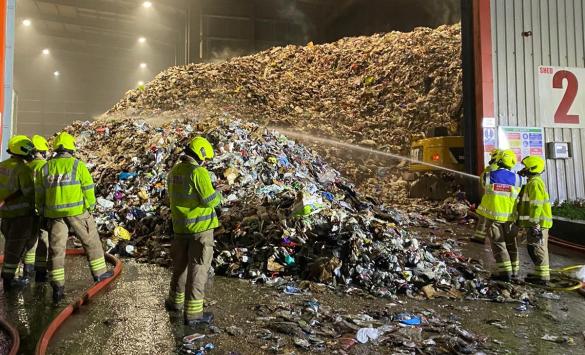Prof Coggins was a well-known and respected authority on waste management and a popular figure throughout the industry.

He served as senior lecturer in Geography, then Reader in Waste Management at Luton College of Higher Education – which later become known as the University of Luton – from 1972 to 1997. From 1993, he was also Director of the University’s Centre for Waste Management.
He later became Director of the University of Sheffield’s Waste Management and Technology Centre and worked there until 2001, where he started his private waste management research consultancy, WAMTECH, of which he was director until his retirement.
Career
His areas of expertise included waste composition, waste strategies and policy, civic amenity sites, market development for wastes as raw materials and technology options for waste as an energy resource, and postgraduate education.
In his later life he contributed to a project charting the development of the waste management sector in the UK, on behalf of the History of Modern Biomedicine Research Group, Queen Mary University of London (see letsrecycle.com story). He talked about his life and career to the project at Biomedicine Research.
Prof Coggins was married to Sue, who passed away last year, and is survived by two children.
Leading the tributes, Dr Toni Gladding, senior lecturer at the Open University, who studied for her PHD under Dr Coggins, shared her memories of him as an academic.
She said: “I would describe him as an exacting supervisor and I do think he had the foresight to see that health and safety would be an issue in the waste industry with the massive changes it underwent in the 1990s from predominantly landfill to recycling.
“The most important thing I should mention is he introduced me to my husband around 1992/93. He knew him in the industry before me, and I met him through my PhD research, basically he introduced us. So I’ve got a doctorate and a husband to thank him for!
“Mostly I remember him sticking to his guns even if his opinion was unpopular, both in the University and in the industry. I’m sure we will miss his bombastic personality.”
Passion
Ray Georgeson, chief executive of the Resource Association added: “I am very sorry to hear the news having known Chris throughout most of my career in waste and recycling, he will be sadly missed.
“He was a great character on the industry circuit, very robust in his views, very good for a lively discussion and also a beer.”
Mr Georgeson also recalled how the two had shared an enthusiasm for collecting model waste trucks, with Prof Coggins having what he described as a ‘legendary’ collection of models. He also collected petro-stamps – stamps related to petroleum.
Knowledge
Professor Margaret Bates, president of the Chartered Institution of Wastes Management, described Prof Coggins as a ‘proper academic’, adding that he was always keen to share his knowledge and his work.
She said: “The main thing about Chris was his passion, whether it was for waste, for Wales, rugby or beer.
“He was also passionate about how waste management could make a difference in people’s lives. He really will be missed, it is a terrible shock.”
Steve Eminton, editor of letsrecycle.com, said: “Chris was a fount of knowledge and wrote a number of pieces for us. It was always worth calling him to find out specific facts and he had an enthusiasm for a wide range of waste and resource-related topics.”
Dr Jane Beasley, who also studied under Prof Coggins, said: “He was the reason I got into waste management. He was really inspiring, really knowledgable and really supportive, he really cared about the subject. The only reason he would ever argue with anyone was because he cared. He is the one person to have had the biggest impact on my career.”
Richard Kirkman, technical director at Veolia, also paid tribute to Prof Coggins and his influence on the sector, adding: “Chris was a great influence on the scientific understanding behind waste and resource management and we had the pleasure of working with and learning from him over the years. More recently we collaborated as part of the History of UK Waste work with Queen Mary University of London and he was an inspiration to all involved.”









Subscribe for free